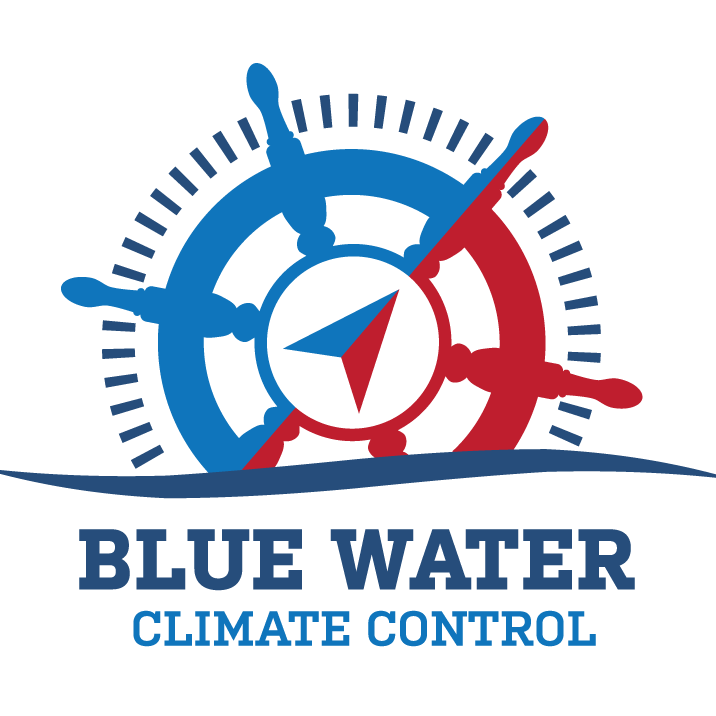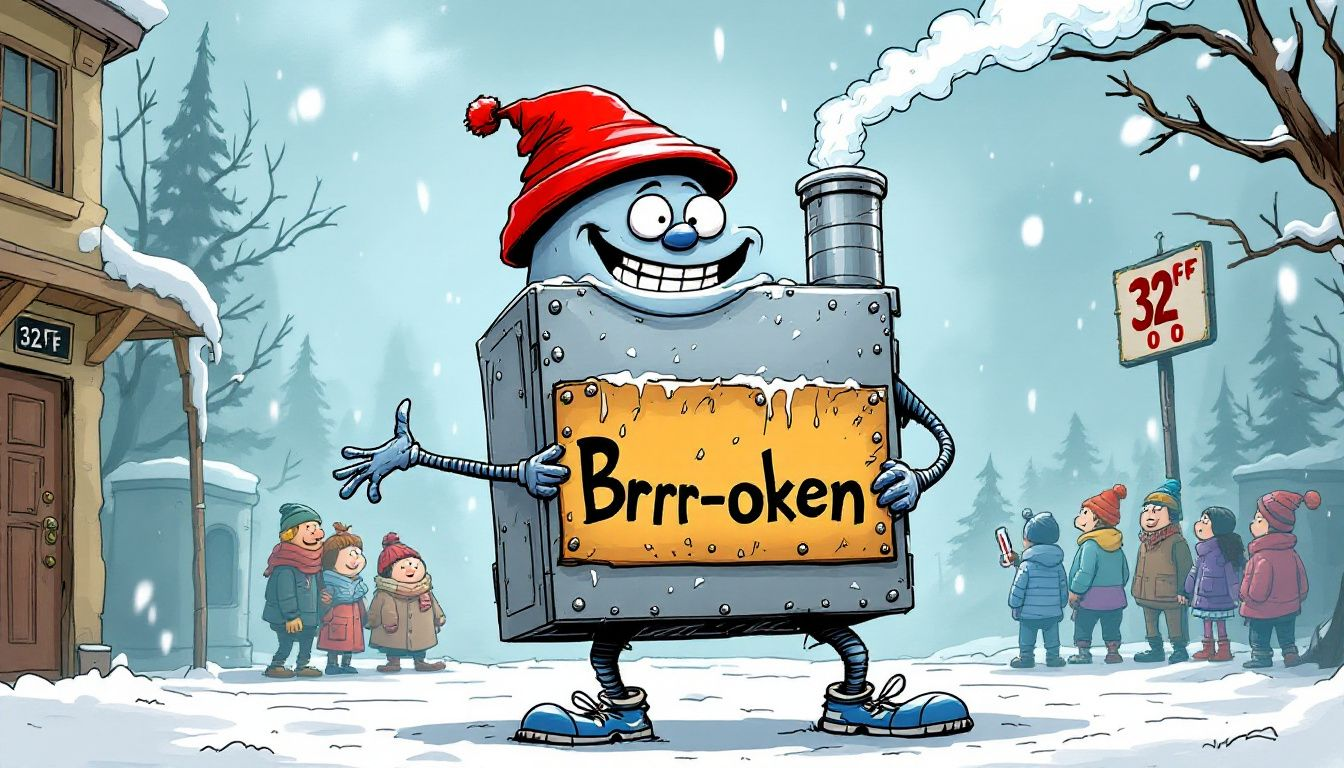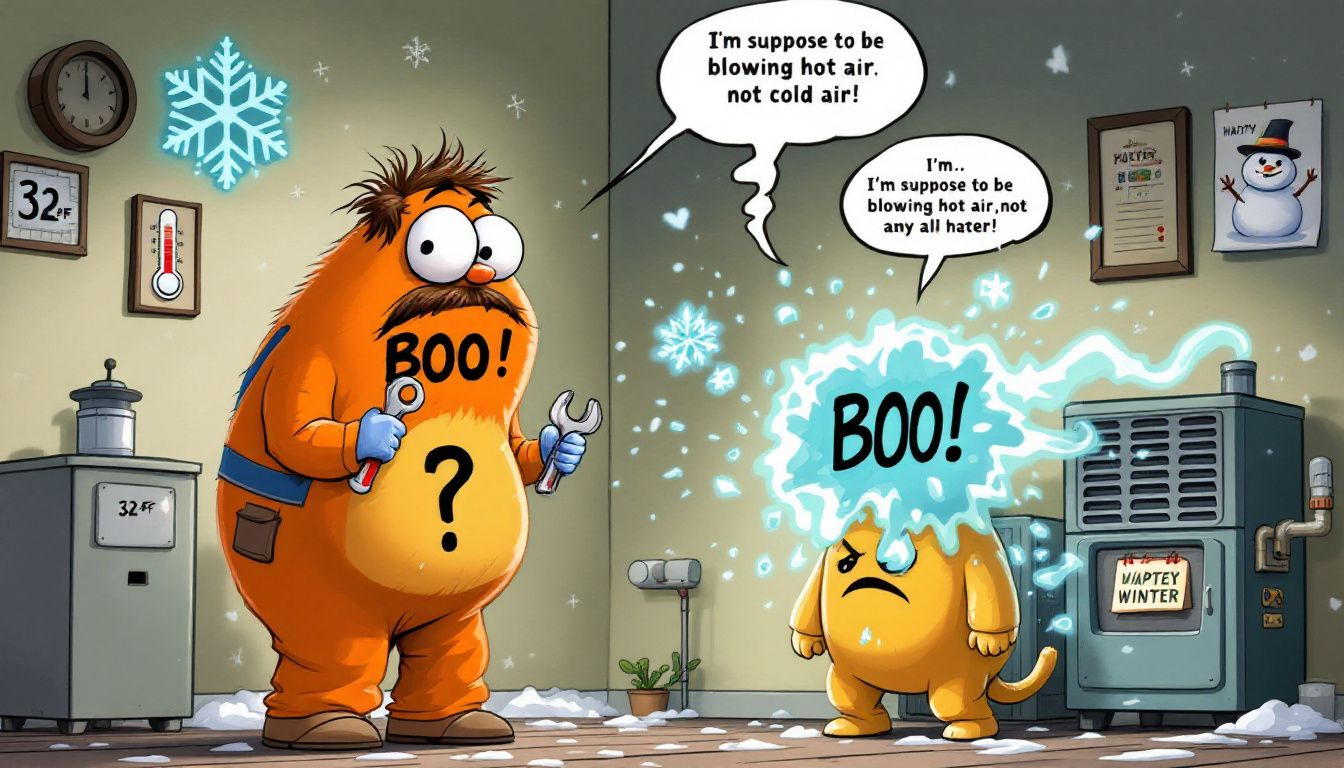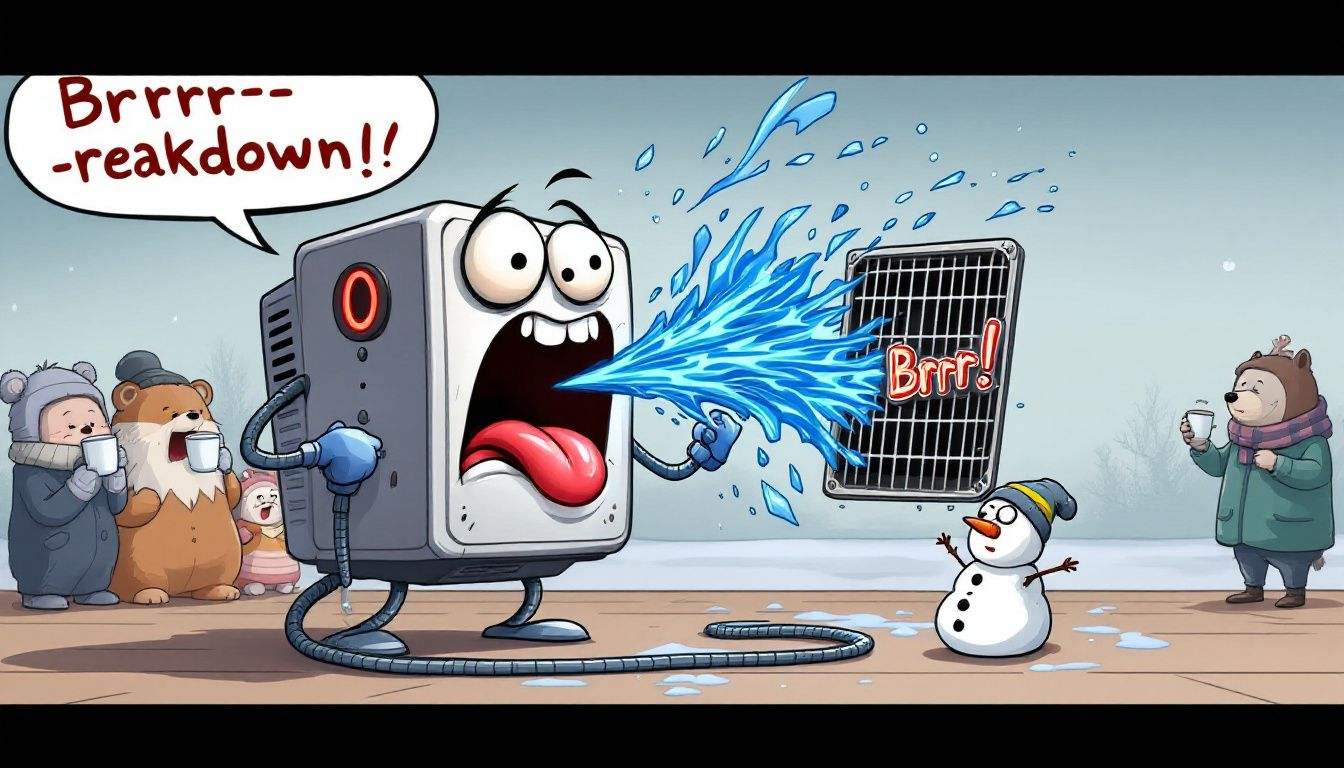Top Solutions for Your Heater Blowing Cold Air
Is your heater blowing cold air? Many homeowners face this frustrating problem. In this article, we’ll explore common causes like thermostat settings, dirty filters, and pilot light issues, and show you how to fix them.
Key Takeaways
Understanding your heater’s components is key to diagnosing why it might be blowing cold air.
Common issues that lead to cold air include incorrect thermostat settings, dirty air filters, and pilot light problems.
Regular maintenance and timely professional help can prevent cold air issues and extend your heating system’s lifespan.
Quick Links:
Understanding Your Heater's Functionality
To address a heater blowing cold air, understanding its functionality is the first step. A heater’s main role is to warm a heat exchanger and circulate hot air through the home’s ducts. This process involves several key components: the heat exchanger, blower fan, and thermostat.
The heating process begins when an electric current runs through metal coils, heating them up. The thermostat plays a vital role by signaling the control board to start heating when the indoor temperature drops below the set temperature. Once the air is heated, the furnace blower forces it through the air ducts, distributing warm air throughout your home.
Modern gas furnaces, whether electric or gas, initiate a heating cycle when the thermostat senses a temperature drop. Knowing these components and their roles can help pinpoint why your heater might be blowing cold air and how to resolve it.
Common Causes of a Heater Blowing Cold Air
There are several reasons your heater might be blowing cold air instead of blowing warm air. Common causes include improper thermostat settings, dirty air filters, pilot light issues, and gas supply interruptions. Each of these issues can disrupt the heating process, leading to cold air blowing from your vents instead of the desired warm air.
Quickly addressing these issues can help avoid further complications. Airflow issues can arise from factors like leaky ducts, dirty air filters, and blocked vents, all of which can cause your heater to blow cold air.
Next, we will explore these common causes in detail and offer practical solutions.
Thermostat Issues Leading to Cold Air
One of the most straightforward causes of a heater blowing cold air is incorrect thermostat settings. For instance, if the thermostat is mistakenly set to ‘cool’ instead of ‘heat’, the system will blow cold air instead of warming your home. Another common issue is setting the thermostat fan to ‘ON’ instead of ‘AUTO’, which causes the blower to run continuously, even when not heating.
Regularly checking your thermostat settings is important as they can alter over time, notably during seasonal changes. Making sure your thermostat is set to ‘heat’ and the fan is on ‘AUTO’ can stop your heater from blowing cold air, maintaining indoor comfort.
Dirty Air Filters Restricting Airflow
Dirty air filters are another common culprit behind a heater blowing cold air. When air filters are clogged with dirt and debris, they restrict airflow, causing the furnace blowing cold air to overheat and shut off, which leads to cold air blowing from the vents. This restricted airflow prevents adequate heating and results in cooler temperatures throughout your home.
Replacing dirty air filters regularly maintains efficient heater performance. Air filters should ideally be checked and replaced every three months. This simple maintenance can prevent cold air issues and ensure smooth operation of your heating system.
Pilot Light Problems
The pilot light is essential for igniting the burners to initiate the heating process. If the pilot light is out, the furnace cannot generate heat, leading to cold air blowing from the heating vents. Common causes for pilot light issues include a faulty thermocouple or dirt blocking the gas valve or pilot tubing.
If the pilot light is out, try relighting it according to safety guidelines. However, if you can’t safely re-light the pilot light, it’s best to contact an HVAC technician for assistance to avoid fire risks. Additionally, ensure that all pilot lights are functioning properly.
Gas Supply Interruptions
Gas supply interruptions can also cause your heater to blow cold air. A closed gas valve or inadequate gas supply can prevent the furnace from receiving the necessary fuel to generate heat. Safety mechanisms may prevent the furnace from igniting if there’s an inadequate gas supply, resulting in cold air.
Check the gas valve to ensure it is open and inspect the gas line for blockages or leaks to resolve gas supply issues. Contact your gas company immediately for a professional inspection if you suspect a gas leak.
Advanced Troubleshooting for Cold Air Blowing Heaters
At times, the issue of a heater blowing cold air may be more complex, requiring advanced troubleshooting. For example, a furnace not producing heat may have an issue at the start of a heating cycle, briefly releasing cold air.
If simple fixes don’t work, contact a repair service promptly to prevent further damage. Next, let’s explore some advanced troubleshooting methods.
Faulty Flame Sensor
The flame sensor is a critical component that tests if the burners are lit and shuts them off if they are not. A dirty or malfunctioning flame sensor can prevent the burners from igniting, causing the heater to blow cold air.
Cleaning the flame sensor regularly can prevent cold air issues. If you suspect a problem with your flame sensor, it’s best to have a professional HVAC technician clean or replace it.
Overheating and Safety Mode Activation
Overheating can trigger an emergency shutdown, causing the heater to blow cold air. Indicators of a furnace frequently overheating include it not blowing hot air. Common causes of overheating include clogged coils and inadequate airflow.
Proper airflow and regular furnace maintenance can prevent overheating issues. If overheating persists, contact a professional to resolve the issue.
Cracked Heat Exchanger Risks
A cracked heat exchanger is a serious issue that can lead to cold air blowing through your vents instead of warm air. This problem not only affects heating efficiency but also poses safety risks, including potential carbon monoxide leaks.
Contact an HVAC technician immediately if you suspect a cracked heat exchanger or a furnace’s heat exchanger to inspect and address the issue. Regular maintenance helps identify and prevent serious problems.
Ensuring Proper Airflow in Your Heating System
Proper airflow is crucial for an efficient HVAC system, significantly impacting comfort and energy costs. Dirt buildup and sharp bends in ductwork can restrict airflow, causing overheating and cold air issues. Routine maintenance and airflow checks can prevent these problems.
Cleaning air filters and ensuring unobstructed vents are simple steps to maintain optimal airflow and heating efficiency, especially when addressing a clogged air filter.
Checking and Clearing Supply Vents
Maintaining unobstructed supply vents is crucial for ensuring proper air distribution throughout your home. Obstructed vents can lead to uneven heating and cold air blowing from the system. Ensure your vents are fully open and unblocked to distribute warm air effectively.
Check regularly for objects like furniture that might be blocking return vents, causing cold air.
Addressing Leaky Ducts
Leaky ducts can cause significant heat loss, making your heater blow cold air. Typically, 20 to 30 percent of air is lost in a home due to leaky ducts.
Regularly inspecting and sealing ductwork can significantly improve heating efficiency. Use duct tape or new pieces of duct to seal leaking sections effectively.
Cleaning Clogged Evaporator Coils
Routine evaporator coil maintenance prevents airflow obstruction and ensures efficient heating. Clogged coils can cause the heating system to operate inefficiently, leading to cold air being blown.
Cleaning and maintaining evaporator coils regularly can improve airflow and heat absorption for optimal performance.
Preventative Measures to Keep Your Heater Running Warm
Regular heating system maintenance is crucial to prevent it from blowing cold air. If a furnace hasn’t been used for several months, it might start blowing cold air initially. Keeping your heating system in top condition before the cold season can save you from unexpected chilly nights.
Upgrading to modern heating systems can improve efficiency and lower energy consumption compared to older models. These upgrades can also provide better temperature control, enhancing overall comfort in your home.
Regular Maintenance Checks
Routine maintenance keeps your heater running efficiently. Check and replace air filters regularly to ensure proper airflow and avoid overheating. Depending on the type, some air filters may need attention every three months, while others might last up to a year.
During a maintenance check, a certified HVAC technician will inspect and adjust components like the thermostat, heat exchanger, main limit switch, pilot light, furnace filter, and evaporator coil. Regularly cleaning these components maintains your heater’s operational efficiency.
Upgrading Old Heating Systems
A high-efficiency heating system upgrade can significantly lower energy consumption and utility bills. Modern systems offer better temperature control and humidity management, enhancing overall comfort. They often include superior air filtration, improving indoor air quality by reducing allergens and pollutants.
Consult an HVAC professional when upgrading your heating system to ensure proper sizing and installation. Eco-friendly designs in new heating systems often result in lower greenhouse gas emissions, benefiting the environment.
Professional Help for Persistent Heater Issues
If your heater still blows cold air despite your efforts, call a professional. An HVAC technician can diagnose complex issues and perform necessary repairs to restore your heating system. Consult a professional to ensure safety before turning the heater back on.
Serious problems, like a cracked heat exchanger, need immediate attention due to potential safety risks. Regular maintenance checks can identify hazards early, ensuring safety in your home.
When to Call an HVAC Technician
Certain indicators make it clear when to call an HVAC technician. If your furnace fails to ignite or continues to blow cold air after troubleshooting, seek professional assistance. Annual maintenance checkups can identify safety hazards and ensure efficient operation of your heating system.
Persistent cold air from your gas furnace, despite troubleshooting, signals the need for professional help. Contact an HVAC or gas company for gas supply issues or complex repairs.
Choosing the Right HVAC Service
Choosing the right HVAC service provider ensures your heating system operates efficiently and reliably. Look for companies with a good reputation, extensive experience, and positive customer reviews. Professional maintenance checks can prevent future issues and extend your HVAC system’s lifespan.
Upgrading old heating systems can improve energy efficiency and reduce long-term costs. When selecting an HVAC service, consider their expertise in modern heating systems and their capacity for comprehensive maintenance and repair services.
Summary
Understanding the causes behind a heater blowing cold air is the first step towards resolving the issue. From checking thermostat settings and replacing dirty air filters to addressing pilot light problems and gas supply interruptions, there are several ways to troubleshoot and fix your heating system. Regular maintenance and timely upgrades can prevent these issues from recurring and ensure your heater runs efficiently.
If you encounter persistent issues, don’t hesitate to seek professional help. An HVAC technician can diagnose and fix complex problems, ensuring your home remains warm and comfortable. Remember, proactive maintenance and timely interventions are key to keeping your heating system in top condition.
Frequently Asked Questions
Why is my heater blowing cold air instead of warm air?
Your heater might be blowing cold air due to incorrect thermostat settings, dirty air filters, pilot light issues, or interruptions in the gas supply. Check these factors to get your heater back on track.
How often should I replace my heater's air filters?
You should replace your heater's air filters every three months to keep the air flowing smoothly and prevent any overheating issues. Regular checks help maintain efficiency and improve air quality!
What should I do if my pilot light goes out?
If your pilot light goes out, you should try to relight it according to safety guidelines. If you're unsure or it's not working, it's best to call an HVAC technician for help.
When should I call an HVAC technician for my heater?
You should call an HVAC technician if your heater won't turn on, blows cold air, or if you suspect any gas supply problems. It's better to get a professional involved for complex issues to keep your home safe and warm.
What are the benefits of upgrading to a high-efficiency heating system?
Upgrading to a high-efficiency heating system can definitely lower your energy bills and give you better temperature control. Plus, it helps improve indoor air quality and reduces your carbon footprint.







